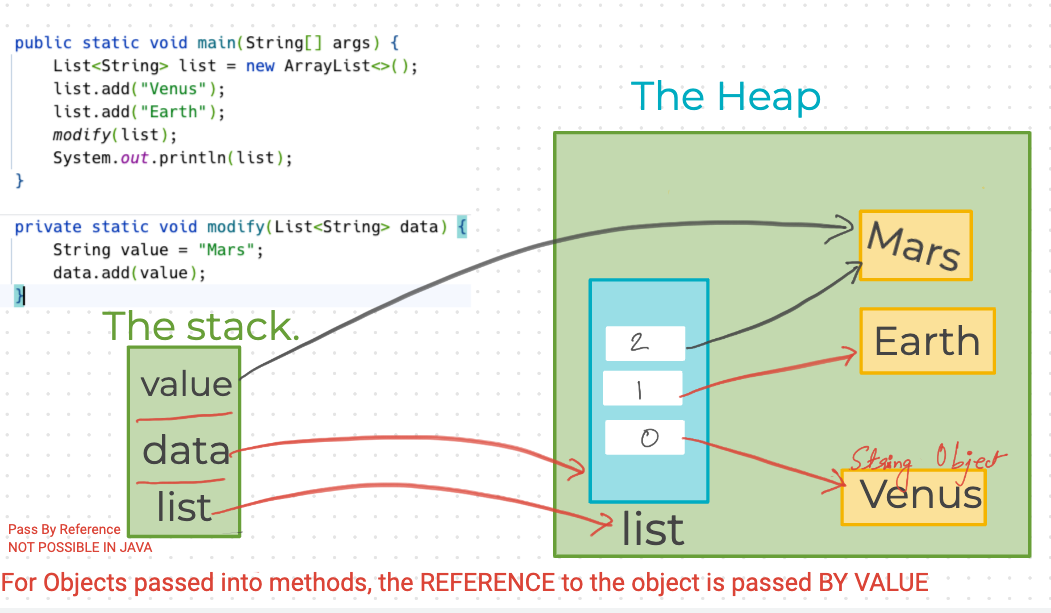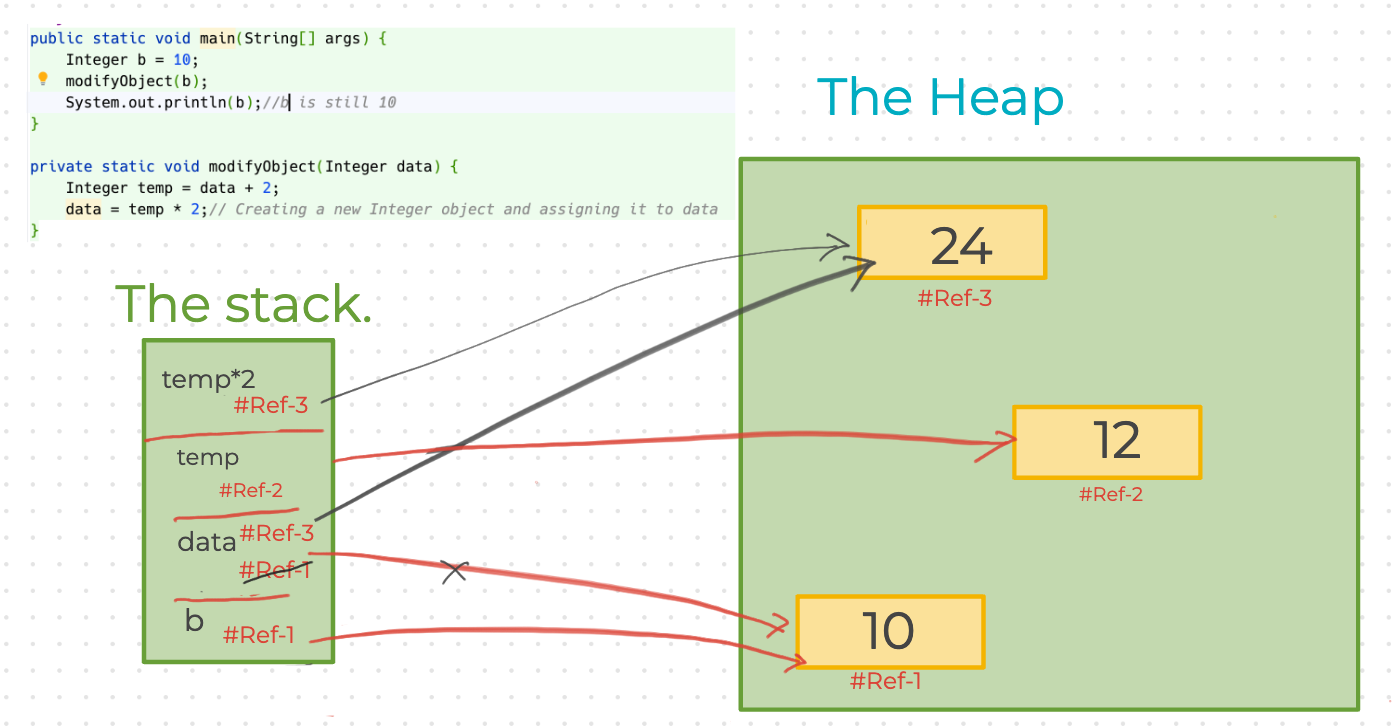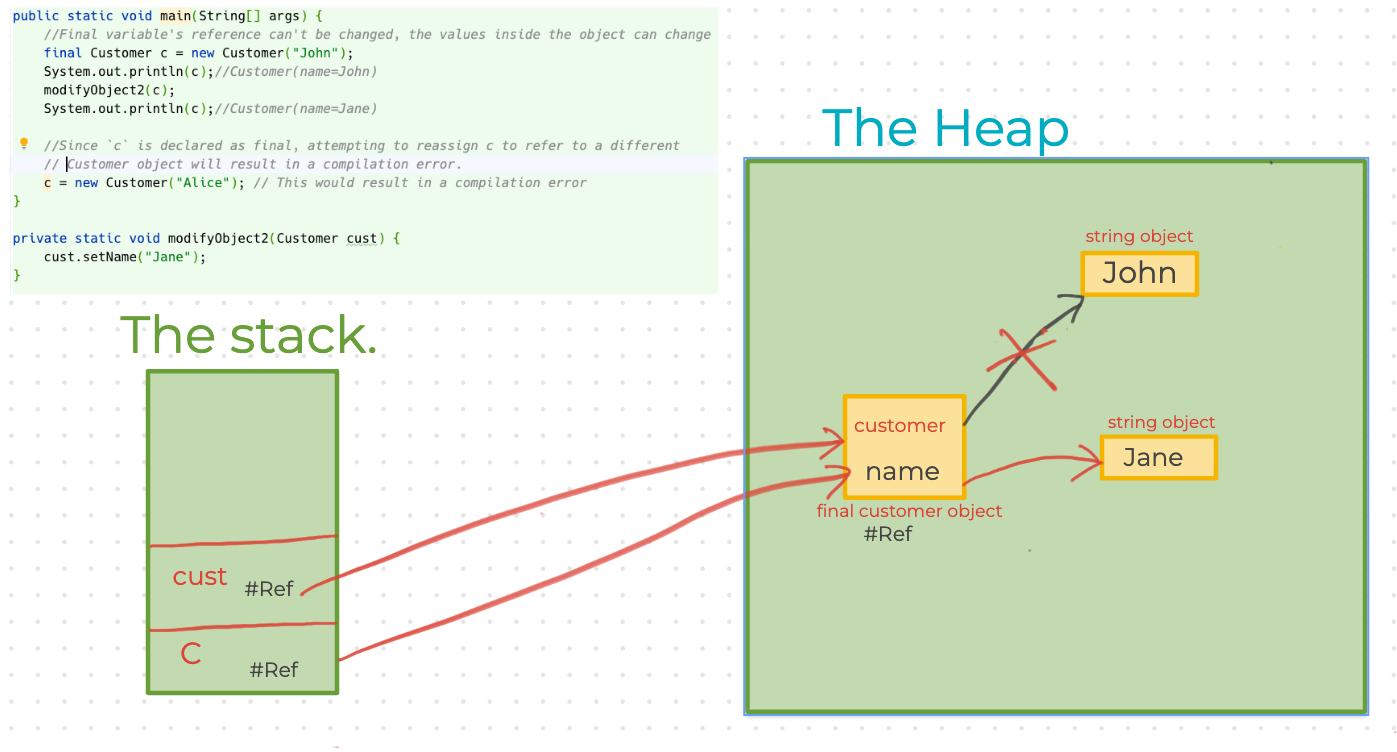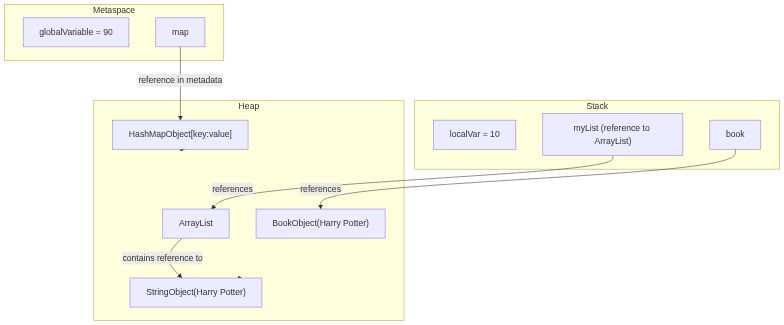Java Memory
The Stack, Heap and the Metaspace (Summary)
Java Memory - The Rules
- All Objects are stored in Heap.
- Variables are a reference to the object
- Local Variables are stored on the stack (thread level variables)
Stack
- JVM Argumenr -
Xss - stores method invocations and local variables.
- Each thread in a Java program has its own stack.
- When a method is called, a new frame is pushed onto the stack, which contains the method’s parameters, local variables, and return address.
- last-in-first-out (LIFO)
- Stack memory is relatively small and fixed in size, typically around a few megabytes.
- Stack memory is efficient for managing method calls and local variables, but it’s limited in size and can lead to stack overflow errors if exceeded.
Heap
- JVM Argumenr -
Xms Xmx - Stores objects and their instance variables
- The heap is a region of memory used for dynamic memory allocation.
- shared among all threads in a Java application.
- The heap is divided into two main regions: the young generation and the old
generation.
- Young generation is further divided into Eden space, and two survivor spaces (S0 and S1).
Objects are initially allocated in the Eden space. When Eden space fills up, a minor garbage collection occurs, and the surviving objects are moved to one of the survivor spaces.
Objects that survive several garbage collection cycles in the young generation are eventually promoted to the old generation.
The heap is larger and more flexible than the stack, but it’s also more prone to fragmentation and garbage collection pauses.
Metaspace
- Metaspace, introduced in Java 8, replaces the older “permanent generation” ( PermGen) for storing metadata related to classes and methods.
- Static primitives are stored in the meta space
- Static Objects are stored on the heap but object pointer/reference is held in the meta space
- Any object on the heap which is referenced from the meta space will never be garbage collected.
- All threads in Java have access to the meta space.
- It stores information such as class definitions, method information, and constant pool data.
- Unlike PermGen, metaspace is not part of the Java heap but is allocated from the native memory of the operating system.
- Metaspace automatically grows or shrinks based on the application’s demand and the available native memory.
- The use of metaspace helps to avoid some of the limitations and issues associated with PermGen, such as memory leaks caused by classloader leaks.
Check generational-garbage-collection
Stack
Every thread will have its own stack which is managed effectively by the Java virtual machine.
Java knows exactly when data on the stack can be destroyed ( via Automatic Garbage Collection Process
public static void main(String[] args) {
int a = 10;//All nums are primitive
int value = modify(a);
}
private static int modify(int data) {
int temp = data + 2;
int result = temp * 2;
return result;
}
The Corrosponding Stack prior to return result
|result = 24 |
|temp = 12 |
|data = 10 | <-- Pass By Value Example in modify(int data)
|a = 10 |
|args = empty array |
Stacks can only be used to store simple data types like primitives
For complex data types, Stack entry keeps a pointer to the object
private Map<Integer, String> idToNameMap;
public List<String> getAllNames() {
int count = idToNameMap.size();
List<String> allNames = new ArrayList<>();
allNames.addAll(idToNameMap.values());
return allNames;
}
The count variable is a primitive type allocated on the stack, and is
therefore
only accessible by the thread that is currently executing the getAllNames()
method.
If 2 threads are executing the getAllNames() simultaneously, they have
2 different versions of the count variable on their stack.
The Heap
Objects and their instance variables are stored in heap
The data on a stack is restricted to ONE thread and can’t be accessed by other threads in our application.
But data on the heap can be accessed by multiple threads.
- the stack is used for local primitives such as ints and doubles, but
- all objects such as Strings, Student,Customer or Integer objects will be stored on the heap
However, there will be a pointer to that object, which is the variable reference and that is stored on the stack.
Java Memory - The Rules
- Objects are stored on the heap
- Variables are reference to that object
- Local variables (primitives) are stored on the stack
Passing variables into methods in Java is always done by making a copy of the variable.
For objects passed as a parameter into a method (let’s say a List),
- the parameter value will be a copy of the list variable, which is a pointer to the object on the heap.
This means that a copy of the pointer to the object is created. The object itself is not copied (into the stack) and in fact it’s not the object that’s passed into the method, but rather a pointer to the object.

The immutable classes
Behaves like primitives
The Integer.String, Double, BigDecimal classes are immutable
- its value cannot be changed once it is assigned.
Therefore, an Integer/String object is passed into a method and it is modified it inside the method, it actually creates a new integer object with the modified value.

The final variables
In Java, when you declare a variable as final, it means that the reference to the object cannot be changed once it’s initialized. However, it does not mean that the state of the object itself cannot be modified.

Metaspace - Since Java 8
Called PermGen prior to Java 8.
Static primitives are stored in the meta space
Static Objects are stored on the heap but object pointer/reference is held in the meta space
Any object on the heap which is referenced from the meta space will never be garbage collected.
All threads in Java have access to the meta space.
Final
int localVar = 10;//Primitive
List<String> myList = new ArrayList<>();myList.add("Harry Potter");
Book book = new Book("Harry Potter");//Object
static int globalVariable = 90;
static Map<String, Integer> map = new HashMap<>();//Static Object
